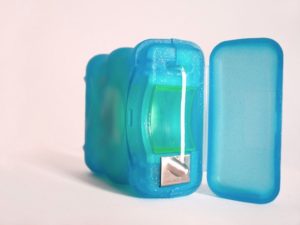Dentist Near Me
 White spots on your teeth can be irritating and affect how you feel about your smile. The good news, however, is that they are preventable and rarely cause for concern. Here are things you should know about what causes white spots, how to prevent them, and what options are available should you already have them.
White spots on your teeth can be irritating and affect how you feel about your smile. The good news, however, is that they are preventable and rarely cause for concern. Here are things you should know about what causes white spots, how to prevent them, and what options are available should you already have them.
What causes white spots on teeth?
- Dental Fluorosis – This can happen when a child consumes or is exposed to too much fluoride during the development of their teeth. While undesirable, this is harmless and can happen before teeth even emerge. The most common cause of fluorosis in the US is the use or ingestion of too much toothpaste.
- Poor Dental Hygiene – Forgetting to brush regularly can cause white spots to develop.
- Braces – Wearing braces for an extended time can affect the coloration of your teeth and create white spots.
- Acidic or Sugary Foods – These foods can damage your teeth as well as change the color of their enamel. Rinsing your mouth after you consuming acidic or sugary items can help negate these effects.
How can I prevent them from appearing?
Following a proper oral hygiene regimen is the best way to prevent white spots on teeth. Ensure your child uses the correct amount of toothpaste – children under 3 should use a smear the size of a rice grain, and children over 3 should not use more than a pea-sized amount. It is common for children to accidentally swallow or fail to spit out toothpaste, so be sure to supervise your child as they are learning.
What are options for treatment?
If you are already dealing with white spots, you have options. Whitening or bleaching can make the coloration of your teeth more uniform. Dental veneers can restore the entire appearance of your teeth, solving not just the problem of white spots. In some cases, topical fluoride or enamel microabrasion upon the white spots themselves can do the trick.
Cosgrove Dental Care 3159 Green Valley Road, Birmingham, AL 35243 (205) 967-4080


 A happy smile is a healthy smile! There are a number of steps you can take to keep your smile healthy by reducing your risk of developing tooth decay. Here are a few suggestions from our team.
A happy smile is a healthy smile! There are a number of steps you can take to keep your smile healthy by reducing your risk of developing tooth decay. Here are a few suggestions from our team. Cosmetic dentistry has been around for ages. We’ve noticed that now, more than ever, people are concerned with overall wellness in addition to a beautiful smile. In past years, we had many patients come to us seeking whitening and seeming unconcerned with ridding their smile of infection and decay.
Cosmetic dentistry has been around for ages. We’ve noticed that now, more than ever, people are concerned with overall wellness in addition to a beautiful smile. In past years, we had many patients come to us seeking whitening and seeming unconcerned with ridding their smile of infection and decay. It can be difficult to get your child to practice proper oral care unsupervised. However, the long-term benefits of an early start to optimal oral hygiene are worth the effort. Below are some tips to help you make oral health a fun part of your child’s daily routine.
It can be difficult to get your child to practice proper oral care unsupervised. However, the long-term benefits of an early start to optimal oral hygiene are worth the effort. Below are some tips to help you make oral health a fun part of your child’s daily routine. Calcium is an important mineral for building strong, healthy teeth, but not everyone can tolerate the lactose found in dairy. Lactose is a sugar found in milk and other dairy products. About 65% of people have reduced ability to process lactose past infancy.
Calcium is an important mineral for building strong, healthy teeth, but not everyone can tolerate the lactose found in dairy. Lactose is a sugar found in milk and other dairy products. About 65% of people have reduced ability to process lactose past infancy. It’s highly likely that after visiting our practice, you understand the value of a thorough, professional dental cleaning. It’s also likely that you may not fully understand the importance of a complete exam and radiographs.
It’s highly likely that after visiting our practice, you understand the value of a thorough, professional dental cleaning. It’s also likely that you may not fully understand the importance of a complete exam and radiographs. Men, dental examinations and treatment are important for you, too. Did you know according to the Academy of General Dentistry (AGD), by age 72 men lose an average of 5 teeth? That number jumps to 12 if you are also a smoker. Here’s what you need to know about keeping your mouth healthy. Follow these tips and you can beat the odds stacked against men and their oral health.
Men, dental examinations and treatment are important for you, too. Did you know according to the Academy of General Dentistry (AGD), by age 72 men lose an average of 5 teeth? That number jumps to 12 if you are also a smoker. Here’s what you need to know about keeping your mouth healthy. Follow these tips and you can beat the odds stacked against men and their oral health. It is not uncommon for many of us to grab a bite to eat in a hurry. Americans have grown accustomed to bigger food portions at restaurants, but our mouths have not. Trying to fit that oversized sandwich or apple in your mouth might be worse for you than you have ever imagined. Below are some reasons why this could be detrimental for your oral health and what you can do about it.
It is not uncommon for many of us to grab a bite to eat in a hurry. Americans have grown accustomed to bigger food portions at restaurants, but our mouths have not. Trying to fit that oversized sandwich or apple in your mouth might be worse for you than you have ever imagined. Below are some reasons why this could be detrimental for your oral health and what you can do about it.




